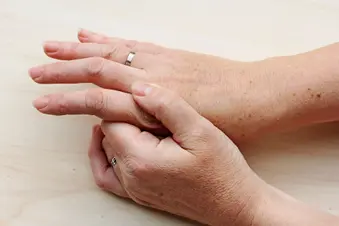
Managing psoriatic arthritis symptoms is more than just taking your medications. Simple lifestyle changes and home remedies can protect your skin, nails, and joints too.
There are things you can do to:
- Relieve symptoms like joint pain or fatigue
- Lower your risk of joint injury or nail damage
- Help your medications work better
- Help prevent psoriasis skin outbreaks
Protect your joints
Simple changes to how you do daily tasks can prevent joint injuries and pain from psoriatic arthritis.
Try protective tools and gadgets to prevent finger injuries. Use grips or jar openers when you grasp or twist a lid. Lift heavy objects with both hands. Push doors open with your body, not your outstretched hands.
Switch your stance. As you work at your desk or watch TV on your sofa, move body positions often. Sit up straight instead of slouching in a chair. Good posture and positioning helps prevent joint injury and fatigue, and it keeps your joints working well.
Get regular exercise. Exercises like swimming, walking, or biking are easy on your joints. They help keep your muscles toned and your joints flexible. Talk to your doctor or physical therapist before you start an exercise program. And start slow. Overdoing it can cause joint pain or a psoriatic arthritis flare.
Ask about splints. In certain situations, your doctor or physical therapist may prescribe a splint for unstable or inflamed joints. They take some stress off your joints and help you feel more stable. Take off your splints for regular stretches to keep joints flexible.
Stay at a healthy weight. Extra body weight puts stress on your joints. Aim to stay at a healthy weight to ease joint pain, boost energy, move more easily, and help your medications work well.
Rest and relax. Psoriatic arthritis pain, inflammation, and medications can cause severe fatigue. Take breaks throughout your day. Don’t overdo any activities. If you’re having a psoriatic arthritis flare, using your joints too much can stress and injure them. Try relaxation techniques like meditation or listening to soft music. Keeping stress at bay can prevent psoriasis skin flare-ups too.
Protect your nails
Psoriatic arthritis can cause serious nail problems like pitted, crumbled, or loose nails. Any injury to your nails can trigger a flare-up, so try these tips to protect your nails.
Keep fingernails and toenails short. Trim nails often to prevent them from pulling away from your skin.
Leave cuticles and nail buildup alone. To prevent a skin infection or psoriasis flare-up, don’t cut, remove, or push back cuticles. Biting nails also puts you at risk for an infection and can make your psoriasis flare. Also, digging out buildup can loosen the nail. Medication can safely loosen this buildup.
Wear roomy shoes. Too-snug shoes can crush your toenails and make nail symptoms worse. Avoid high heels to lower your risk of toenail injuries too. Flip-flops may seem comfy, but they expose your toes and toenails to injury.
Protect your skin
Try these tips to keep your skin healthy and relieve scaly plaques.
Moisturize skin daily. Apply rich, thick, fragrance-free lotions to your skin often to ease dryness, itch, and flaking. It’s especially important to moisturize skin in winter. Cold, dry weather makes skin symptoms worse.
Skip long, hot showers. Take 5-minute showers and 15-minute baths to prevent dry skin and psoriasis skin flares. Wash your skin with warm water, not hot. Shower or bathe no more than once a day, and use gentle soap made for sensitive skin types.
Toss your loofah. These rough surfaces can irritate your skin and cause a psoriasis flare-up. Wash your skin with your hands. Gently blot your skin dry with a soft towel, then apply moisturizer.
Drink lots of water. This helps protect and moisten your skin from the inside. Get plenty of water each day. If your pee is pale yellow in color, not dark gold, you’re well-hydrated.
Prevent skin traumas. Psoriasis can flare if you irritate, scratch, or scrape your skin. Wear shoes indoors and outside to avoid stepping on a nail. Wear gloves to protect your hands during chores. Spray on DEET-free insect repellent before you go outside to prevent itchy bug bites that cause you to scratch your skin.
Use sunscreen outdoors. While sunlight may relieve psoriasis plaques, protect your skin from sunburn. Apply fragrance-free, broad-spectrum sunscreen lotions with an SPF of 30 or higher to your skin, including any areas where you have skin plaques.
Don’t overheat your skin. High temperatures and sweaty skin can trigger psoriasis outbreaks. Wear a hat, long-sleeved cotton shirt, and long pants on hot, sunny days, or stay indoors with air conditioning to keep skin cool.
Don’t smoke. Tobacco smoking makes skin symptoms more severe. And limit how much alcohol you drink to lower your risk of a skin symptom flare.
Show Sources
Photo Credit: Astrid860 / Getty Images
SOURCES:
Arthritis Foundation: “Skin Protection Tips for Psoriatic Arthritis.”
American Academy of Dermatology Association: “7 Nail Care Tips That Can Reduce Nail Psoriasis,” “8 Ways to Stop Baths and Showers From Worsening Your Psoriasis,” “Psoriatic Arthritis: Tips for Managing.”
Cleveland Clinic: “Psoriatic Arthritis: Management and Treatment.”
Mayo Clinic: “Psoriatic arthritis.”
National Psoriasis Foundation: “When Psoriatic Disease Strikes the Hands and Feet,” “Taking Care of Your Skin in Summer.”